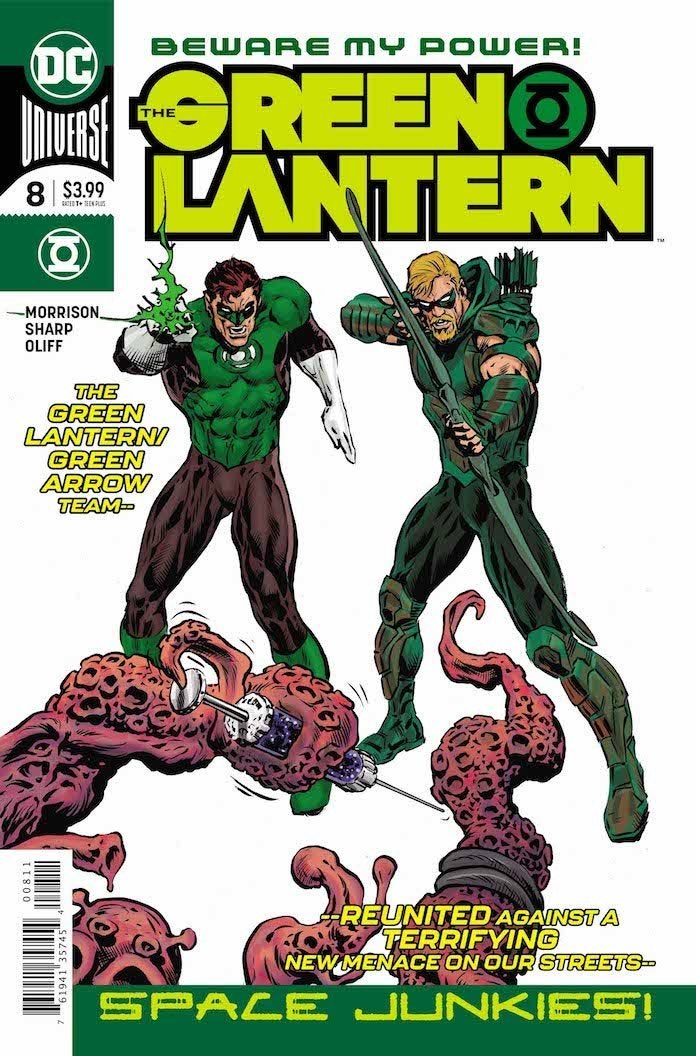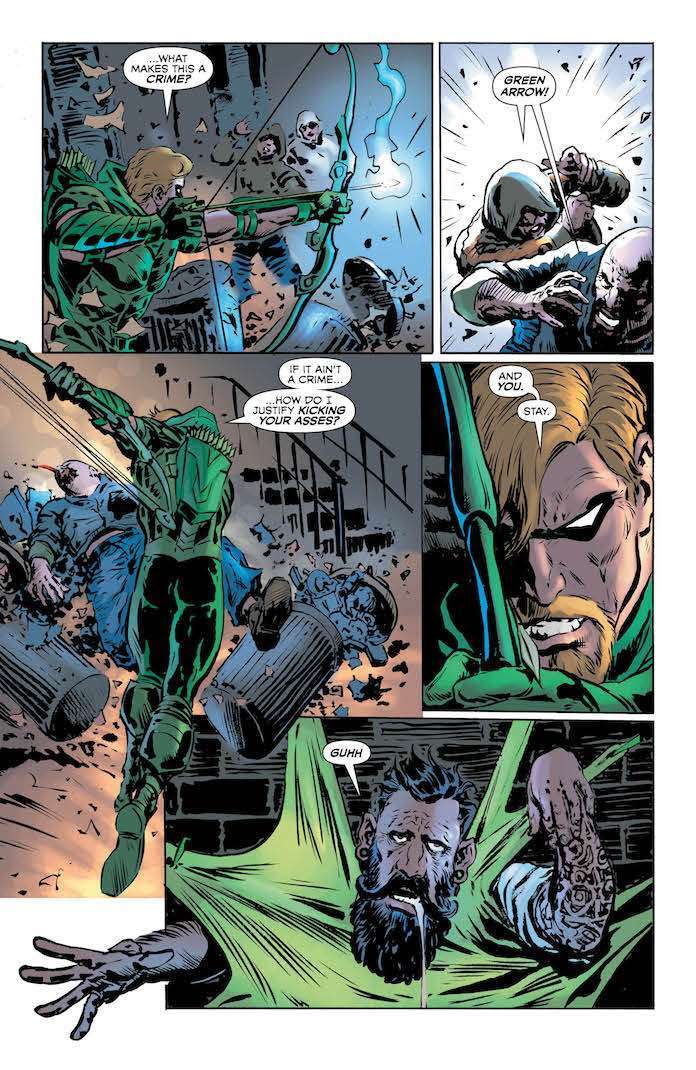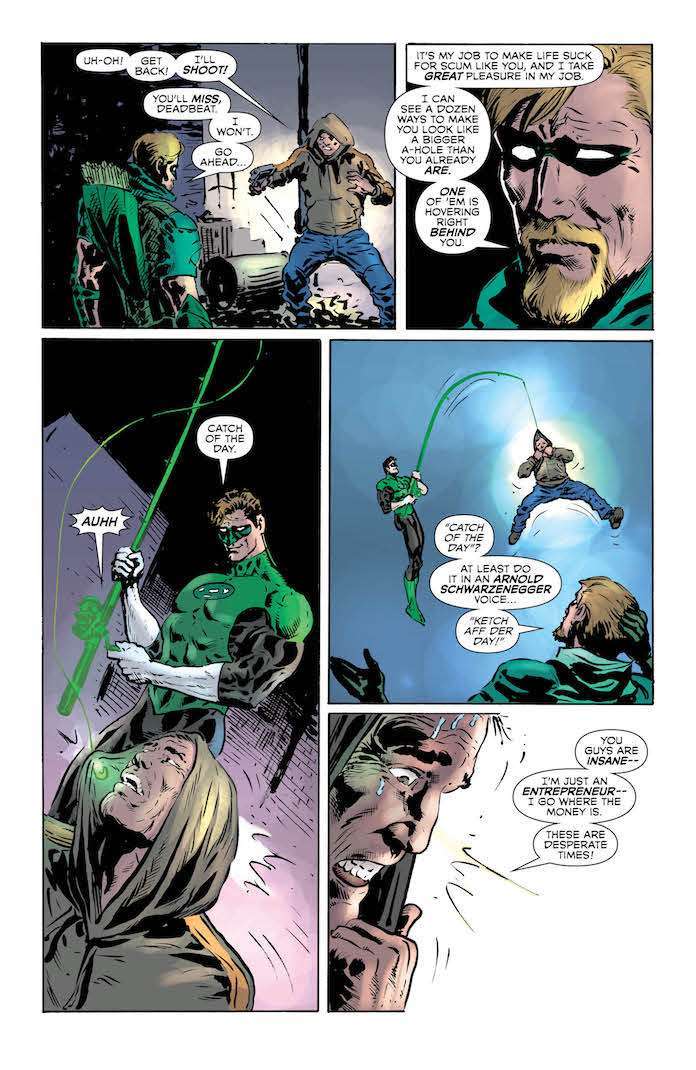Liam Sharp and Grant Morrison On Channelling O'Neil and Adams For The Green Lantern #8
Morrison and Sharp joined ComicBook.com to discuss the issue, which you can get at comic book [...]
Morrison and Sharp joined ComicBook.com to discuss the issue, which you can get at comic book shops and online via ComiXology, Amazon, and Barnes & Noble today.
You have a style that is not entirely dissimilar to Adams's, but certainly this issue very clearly you were making a deliberate homage. How do you kind of keep your own style while clearly evoking somebody else?
Liam Sharp: That was tough, actually. When you look at Neal's stuff he does it so effortlessly, and a lot of it's about the energy; a lot of it's about the angles he uses. None of us are him. He's a genius and I would never claim that mantle for myself, but even imitating genius is pretty tough. So it was not easy. It was much harder than I expected. And of course all the while, the point was to try to evoke it rather than slavishly replicate it, so thank you for realizing that that was the intent, because it was.

I think the main thing was the way that Neal sort of really plays up the angles and the way he'll place a figure in a panel, and the shots looking up at the face or down at the face or the dramatic kind of foreshortening that he's famous for. All of which are tricky to pull off, but I gave it my best shot.
I think that not necessarily in terms of artwork but in terms of the aesthetic and the tribute that you're going for here, my favorite panel was an upshot of Hal's nose that was in the bottom corner of one page, because it was just like, "yeah, that's exactly a panel that I feel like Adams would've done."
Sharp: Good. There are some direct references. There's a pen holder with a couple of rhinos that was completely out of the original run, and the idea being that he's still got all these old bits and bobs around the house. And obviously they're talking about it, and Hal's talking about it, so I wanted to have one that was absolutely straight out of the original run just to sort of drive that home a bit. It's a lot of things like that.
The flying horse as well, the green Pegasus, that was something I'd seen from Neal and Denny's run. So that was fun too, but yeah, all of those things were influences. I think of the Xeen Arrow character in this issue, he was very much me sort of trying to draw the Neal Adams version. He's even wearing the costume, even though he's all distended and sort of elongated. It's the old costume, which should be fun I hope for some people to see.
Was it challenging coming up with Glorigold's look? This is one of those situations where you nailed the feel of the period so much that I had to go to the DC Wiki and check if he was an existing character.
Sharp: Well he does exist. He was done in one of the Kirby Green Arrows a long, long time ago, but you saw him in the distance, this tiny, tiny little figure. So you didn't really get a good sense of him.
Grant Morrison: We were looking at the Green Lantern/Green Arrow things, and I had this idea: what if Kirby had taken over and done Green Arrow in 1970 instead of Jimmy Olsen? So it was like taking those ideas from Kirby in the '50s, the Xeen Arrow thing, the weird extra-dimensional aspect to Green Arrow which did not fit at all...but bringing that back in and thinking, "what if Kirby had done this, and Kirby had written the stories, and you had to draw them?" And I love what you've done, mate.
You know I used all of Denny O'Neil's vocabulary and you used Neal's vocabulary and I think it's really stuck. It feels like a lost issue of those ridiculous, relevant comics.

When you first came to The Green Lantern, did you guys immediately know, "at some point in the run, we're going to have to do an issue like this?" Or was this something that came up organically?
Morrison: No, it came up...it's like, in season two we have a Flash team-up, so there had to be a Green Lantern/Green Arrow team-up and it had to be relevant, but we also had to parody all of that stuff and to be a bit cheeky about it.
Sharp: Yeah, it's definitely cheeky.
Morrison: But it uses Denny O'Neil's vocabulary, I hope people notice that. I worked it all out.
Sharp: It's so good. It's just moments, and the beautiful sort of buddy comedy between the two. It's very bittersweet.
Morrison: Yeah, and it's just like, two great friends, like two dudes who love each other and all the complications of that. And I love doing a male friendship like that.
It's also fun to see the reversal of the roles a bit. Hal, the "staid, conservative voice," has never really settled down in his life and is crashing on Oliver's couch.

Morrison: Yeah, Hal's got like, a thousand girlfriends, and Ollie basically only loves Dinah. And is always this basically monogamous dude, but he pretends to be this super sexy, hippie...so I kind of love that we played off that. Hal's actually the one who has the best time, but always pretends that he's the happy superhero, he's monogamous...no, actually, Hal is a weirdo. Hal is a polyamorous space tomcat.
We talked about this -- the poignancy of Green Arrow is trying hard to be what Hal wants him to be. This guy, Green Arrow, has been through a lot of s--t. His partner's dead, everything's gone wrong in this boy's life. But here, he's trying really hard to be what Hal wants him to be. And I think that's quite poignant and brilliant.
Sharp: Yeah, I love that as well. Especially at the second-to-last page, which I won't spoil, but there's a lot going on there below the surface for those that want to catch it.
Actually, without spoiling the reveal...is that guy on the last page setting something up for later, or was it just a nod to the era?
Morrison: Totally. Yeah, that boy in the last panel is very much teasing things coming up.
Sharp: Yeah, he's got quite a twinkle. You definitely want to see him come back.
Morrison: Yeah, but look at the costume colors. Look at the costume colors.
I asked Liam earlier, but what was it like writing a throwback story like this while trying not to lose your own voice?
Morrison: Honestly, I studied all of Denny O'Neil's vocabulary and every phrase that he used in all the captions and just recreated it. It was an evil reconstruction of something, but with a bit of satire added. Honestly, it's like I said, like Liam did...it's not like the usual Neal Adams foreshortening poses. It was very specific, like, "here's a foreground head and shoulders, and here's this guy in the background." Everything has worked out. Look at the body language of all the characters, it's really cleverly worked out.
Sharp: It was a ton more work than it looks like.
Morrison: But it should always be. Comics cost a lot of money. We should give them major value. You should be able to read these things a thousand times.
Sharp: You have to kind of try and make it look effortless, but it's definitely not with this kind of material. Neal was so good at getting not only urban landscapes but the environment, he made it really gritty and crunchy.
This sounds like a softball question, but it's honest: you guys seem like you're having the time of your lives on this book.
Sharp: Yeah. I really hope that comes across, because literally I've never had another series where every time I start another issue, it's like starting a new series. And that's always exciting, so I just can't wait to see what each new script is and I hope that comes across. That's why I'm skipping San Diego this year, because I just don't want to get out of the mindset. I want to stay in this place, especially right through to when I finish the twelfth issue of the first season.
Morrison: I'm writing stuff that this amazing artist can draw, this amazing brilliant collaborator. I'm having the best time of my life with this boy. I'm doing this with Liam and Wonder Woman with Yanick [Paquette], and that's it. And so to see this level of invention and brilliance, it's like, we're just putting it out. It's my last chance to talk about American comics.
Do you have plans post-issue #12? Or are you kind of taking that day-by-day at this point?
Morrison: We have plans. I've got an entire second season of things I would love him to draw, basically.
Sharp: And I'm going to draw them, yeah.
Morrison: There're like 12 issues of things I want him to draw, like you've never seen before ever in comics.
2comments